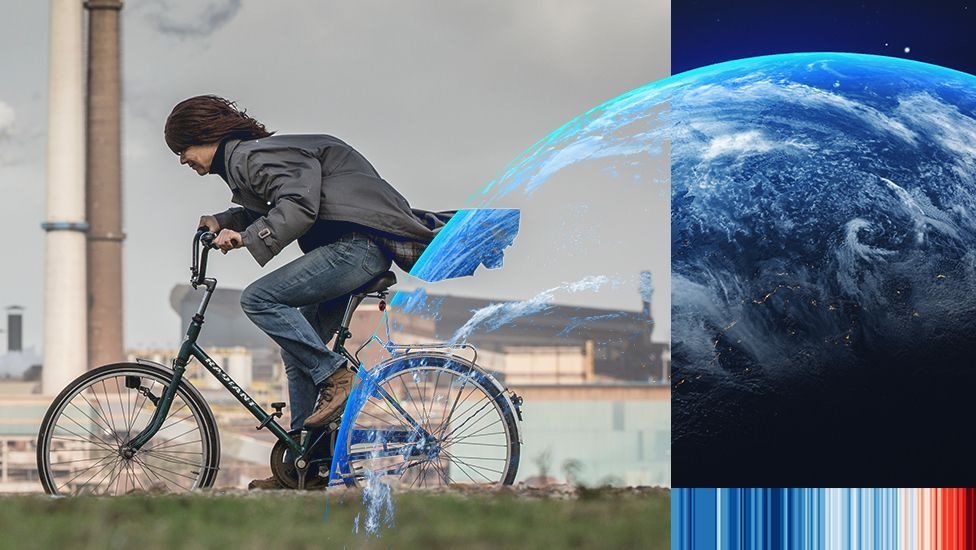Climate change: Four things you can do about your carbon footprint
- Published

Tackling climate change will require world leaders to take action on a global level.
But as individuals we also contribute to warming emissions. Here are some things you can do to reduce your personal impact.
1. Insulate your home
From installing a heat pump to turning down the heating, there is a raft of changes around the home that can help the planet.
"Switching from a gas or oil-powered heating system to an electric heat pump makes a considerable difference," according to Dr Neil Jennings, an academic from Imperial College London.
"On a day-to-day basis, switching off lights and appliances when not in use can help us to save money while reducing our impact on climate change."
The UK government currently offers grants of £7,500 for the installation of heat pumps in England and Wales. The Boiler Upgrade Scheme runs until 2028.
Improving insulation in our walls, ceilings and windows can reduce the loss of heat from our homes and the amount of energy needed to heat them.
Draught-proofing is one of the cheapest and most effective forms of insulation, according to the Energy Saving Trust (EST). This involves blocking up unwanted gaps that let cold air in and warm air out, such as around windows, doors, skirting boards or open chimneys.
The EST estimates that draught-proofing could save £155 a year on average household bills.
Switching to a green energy provider or a green tariff can significantly reduce your household's carbon footprint. But an increase in wholesale energy prices, exacerbated by the war in Ukraine, means many providers have withdrawn their offers.
2. Cut out food waste and cut down on red meat
Livestock creates 14% of all greenhouse gases globally, with cattle being by far the largest contributor.
The simplest and most effective way to limit your impact is to reduce meat and dairy in your diet, particularly red meat such as lamb and beef.
Good news for vegans, obviously - but there are other considerations to take into account.
It's not just a question of "tagging individual products as good or bad", says biologist Prof Margaret Gill of the University of Aberdeen.
She says the carbon footprint of any given food also depends on how it is produced, where it comes from and whether it's in season.
More on the COP28 climate summit
Dr Jonathan Foley, who investigates climate change solutions, says you can save money and reduce waste by making smaller portions and saving leftovers for later at home.
The world wastes between 25% and 30% of its food, according to the Waste & Resources Action Programme. Between 8-10% of global carbon emissions are linked to unconsumed produce, according to a UN report.
Climate Basics: CO2 explained
3. Drive less, fly less
Transport is responsible for almost a quarter of carbon dioxide global emissions.
Living car-free might be "the most impactful thing we can do to reduce our transport emissions," according to Dr Jennings.
However, ditching the car is not possible for everyone, particularly if you live in an area without good public transport or are disabled.
Small steps still have an impact, like walking and cycling to the local shops or sharing car journeys with friends or neighbours.
Electric cars are becoming more widespread, but they are still prohibitively expensive for some people and charging infrastructure is limited in places.
Unfortunately for keen travellers, flying is one of the most carbon-intensive things we can do as individuals.
Domestic flights have the largest emissions per person per kilometre.
Train journeys can have less than a fifth of the impact of a domestic flight, although they might be more expensive. Booking in advance can help reduce the cost.
"For those who fly a lot, reducing the number of flights you take will make a considerable difference to your personal footprint," says Dr Jennings.
4. Think before you buy
It takes 3,781 litres of water to make one pair of jeans, according to the UN's Environment Programme, taking into account cotton production, manufacture, transport and washing.
You can limit your impact by repairing minor faults in clothing rather than replacing them, donating rather than throwing away and choosing higher-quality items that you think will last longer.
An increasing number of companies are offering clothes to rent, which helps reduce waste in the fashion industry. You could also try buying second-hand.
Choosing the right household appliances can also have a positive effect on your carbon footprint. Dr Jennings suggests making sure you are buying the most energy-efficient products, such as washing machines, when they need replacing.
What questions do you have about COP28?
In some cases your question will be published, displaying your name, age and location as you provide it, unless you state otherwise. Your contact details will never be published. Please ensure you have read our terms & conditions and privacy policy.
Use this form to ask your question:
If you are reading this page and can't see the form you will need to visit the mobile version of the BBC website to submit your question or send them via email to [email protected]. Please include your name, age and location with any question you send in.